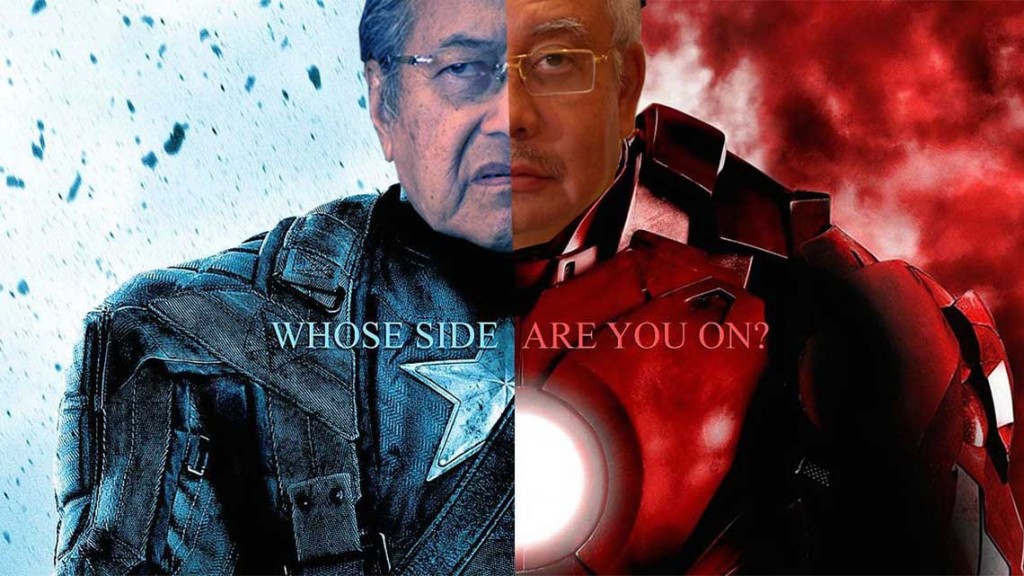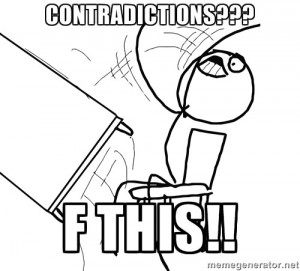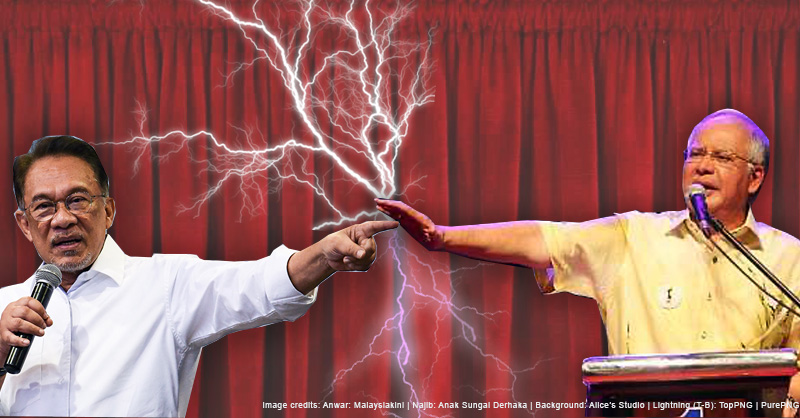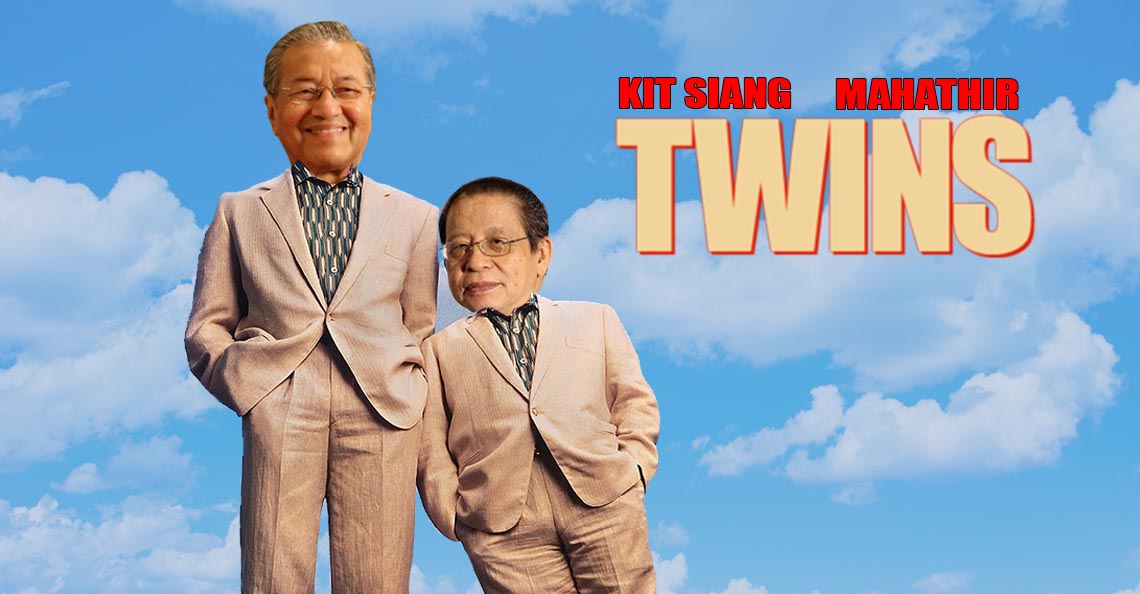5 signs you may be a blind Malaysian political zombie
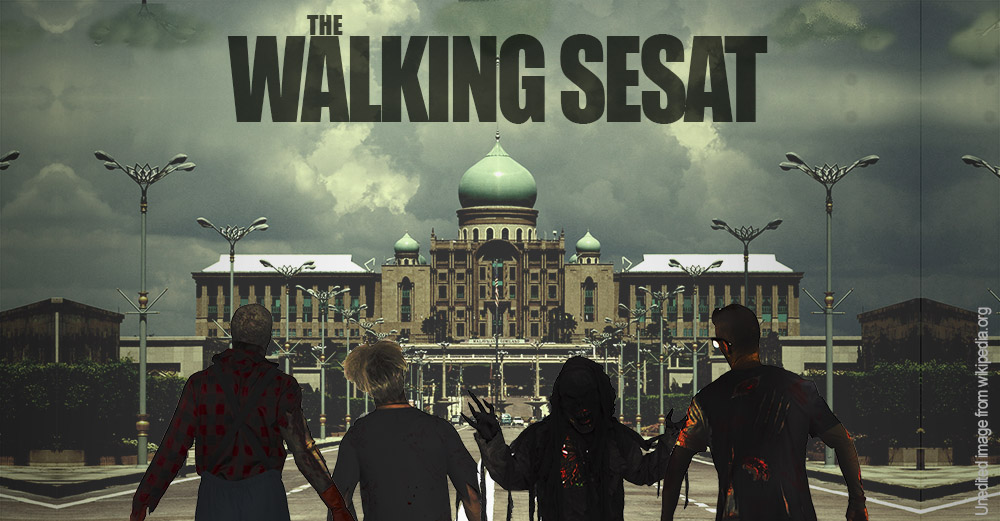
- 2.0KShares
- Facebook2.0K
[Ed’s note: The author of this article is an academic at the University of Malaya]
Sometimes you may question the antics of some hardcore political supporters. You may be like… “WTF is wrong with these people? How can they be so irrationally loyal to their gang even when it does things which are (likely) immoral or illegal? How can they be so inclined to do things that ‘normal’ people (like me) would not?” Examples abound.
Nazis hating the Yahudis with extreme prejudice. ISIS suicide squads who kabooboom themselves in full house kopitiams in the name of Allah. Defenders of the alleged songlap of 1MDB and the Cowgate scandals. Labelling the moderate G25 group sesat. Pakatan Rakyat supporters who saw no wrong with the Kajang Move. Etc etc.
You may be thinking to yourself, “Why can’t they be rational?!” Ahhh… But guess what? Science says we ALL can easily succumb to the dark forces of groupthink and transform into blind political zombies. There are 5 ways to know if you are one yourself. The more traits you have, the more zombiefied you are.
1. You think that anyone who doesn’t agree with you, wants to destroy you
How it works:
In order to unite group members, your taikor will tell you that there are other groups out there – real or imaginary – that threaten our very existence, everything we care for, and everything that we believe in. This is very effective in rallying support because once we are convinced there is a perceived threat to our survival, our primal emotions and instincts kick in. We are then compelled to unite against this threat (source).
Social psychologist Henri Tajfel’s classic experiment in the late 1960s demonstrates how classifying people into groups causes group members to discriminate themselves from others. This ‘we vs them’ behaviour happens to ensure that the gang would stand a better chance of survival. Anything that benefits the competing gang will cause ‘us’ to lose power, prestige and other precious resources. And that is BAD for ‘our’ gang. Your gang members will say there are no shades of grey. It is either them or us.
“If Umno were rejected, this country will be ruled by those who are against the Islamic struggle, who reject the Malay and Bumiputera struggle” – PM Najib
For example, if you are an UMNO supporter, your taikors will tell you who your boogiemen are. Anwar Ibrahim la. DAP la. Cina la. Bersih la. LGBT la. Yahudi la. The USA la (during Tun Mahathir’s PMship – ironically Tun Mahathir is now seen as the bad guy). Whereas PR supporters are told their boogiemen are BN politicians. Whichever camp you may belong to, you all share the same way of thinking: your enemies are out there to harm your interest, so you gotta support your group! Power in number and unity!
To be fair, hardcore supporters from both sides of the Malaysian political divide are quite good at making memes, calling each other brainless macais (Images from Tun Faisal’s Twitter and an anonymous contributor)
But here’s why it’s SCARY:
Having a defined enemy can be quite dangerous and unhealthy as it creates hostility and adversity between groups. This means, there’s probably no chance of having friendly mamak sessions. As a member, you will view the outgroup with suspicion, amplify all the ‘bad’ things they do, and you won’t acknowledge any good in them.
For example… while many people are noticeably pissed with PM Najib Razak for a whole variety of FUBAR policies and other questionable practices, have you considered some of his (possible, albeit debatable) plus points? The Klang Valley MRT project for example that will possibly improve current transportation standards and land value? Warming of ties with the USA?
Also, without fair, tolerant and compassionate leadership, ingroup-outgroup identities can create unnecessary hostile competitions that lead to racism, xenophobism, bigotry, sectarianism, intolerant antisocial behaviour and criminal intimidations (source, source).

Even more troubling, we have seen how friendships have been broken over the last general elections all because of political allegiances. :’(
2. You don’t share your thoughts… instead you follow everyone else
How it works:
Do you recall the last time you gave in to peer pressure? Your gang have decided to watch Mat Moto™, but you’re the only one who wants to watch Star Wars: TFA™. Your gang have decided to go to mamak for supper, but you are the only one who wants to go to McDs™.
Did you say at any point, “EH GUYS DUN WAN LA!!!” No. Of course you did not. You gave up your desires and followed the crowd. You want to be seen as a supportive member.

Back in the 1950s, one dude by the name of Solomon Asch conducted an ingenious experiment to show how people voluntarily conformed to decisions made by the majority – despite not agreeing with the rest. Subjects had to verbally state their answers to a vision test – ‘which line was the longest?’ Here’s the thing: all participants were penipus, except for ONE person. They’d answer the WRONG answer on purpose, just to see what the oblivious dude would answer next. The poor guy didn’t want to be alone, so he blended in with the rest by changing his answers.
Why does this happen? Your evolutionary desires and instincts want you to be part of a group, and you don’t want to be singled out as ‘THAT guy’… oh you know, that irritating obnoxious attention whore who doesn’t give a s**t about anybody else. You want to feel LOVED! ACCEPTED! A SENSE OF BELONGING! Well, at least you don’t want to be hated. You don’t want to be…
But here’s why it’s SCARY:
Cold hard stares. Boycotting. People boh-song you.

Groups usually want to maintain unity through sameness, and this can only happen when all gang members agree to common norms. So naturally when one member refuses to agree, everyone else gets pissed. They will generally treat that fella like crap and they will want to expel this fella from the group. We see this happening frequently in recent times with UMNO, and occasionally, with PR too.
Because of its effectiveness in making people conform, groups commonly employ peer pressure to maintain harmony among its members and to accomplish objectives. If the group decides to become batsh*t crazy, its members too are pressured to follow. Something of relevant note: In 1971, Phillip Zimbardo did a study (‘Standford Prison Experiment’; watch the movie trailer here) to show how people lose their self identity in groups.
In this study, subjects were divided into two groups: prison warden and prisoners. They were given outfits to match their roles and placed in a make-shift prison in the basement of the Stanford psychology building. The research which was supposed to have taken about a few weeks ended much earlier. Why? The prison wardens started to become abusive and cruel towards the prisoners, causing the prisoners to become emotionally broken.
Long story short: peer pressure part of a group can make you become less self-aware of your own actions, and compel you to do things you otherwise wouldn’t do.
3. You NEVER question your leader, no matter how questionable he/she is
How it works:
In the animal kingdom where animals like wolves, lions and gorillas live in packs, there is always a sole leader: the alpha. The most powerful among all. Its underlings obey its will, and more often than not, they show their admiration for their taikor. We see a lot of similarities with the human species too.

If you have ever been part of a very big and structured and hierarchical organisation, you may have come across notices, advertisements or people telling you what awesome people your big taikors are. Some would go as far as to say, these leaders have been elected by God himself. To challenge these leaders then, is akin to challenging God! (FYI: This is a common occurrence in places where religion is embedded in politics. Related source)

Given that leaders tend to develop a cult-like following, hardcore supporters will worship them as though they are like living gods (source). The celebrity frenzy created by the continuous reminders of how awesome they are, make people behave irrationally. People love being around with powerful people because the powerful are famous – unlike them. Disappointingly, most famous celebrity leaders don’t really care about their insignificant fans.
Here is a little bit of trivia: If you exhibit signs of extreme celebrity worship – you know, like having their posters in your room or you get overly excited over your celebrity crushes when you see them in person, you might just be having an array of psychological disorders as studies have suggested (source, source). Just sayin’.
But here’s why it’s SCARY:
If you give in to this idea of an amazing and flawless leader, you won’t mind using your body as your taikor’s bulletproof vest. After all, your evolved primate brain will reason that it is inappropriate to rebel against a person you respect, love, admire and mandated to protect. Like a multi-level marketing business plan, you will soon create down-line grassroots, telling others what a super virtuous dude your figurehead big boss is. Guess what? Leaders love this. It helps boost their self-esteem, and more importantly, it allows them to control their supporters and use them as pawns (related source).
See the problem? If you idolised a psycho fella, you will not be inclined to question his decision. You will think of the guy as being a poor misunderstood soul who deserves a second chance. You will excuse his evil acts, and twisting facts to justify them. Whatever he says, you will support without question.

4. You surrender your decisions and responsibilities to the authorities ‘who know it all’
How it works:
There are many ways we know that certain people are more powerful than us. Apart from their Datuk-ship, Tan Sri-ship, we can also tell by observing how they dress, speak and behave. People with authority tend to wear their fancy shmancy clothes (uniforms with ranks included), speak very atas, and boss people around with directives to show how powerful they are. They may sometimes issue warnings like saying, “Jangan persoalkan, ini hak saya sebagai Perdana Menteri!” When people feel authorities asserting power on them, they are likely to give in and obey. Or shut up. Oh, that reminds me of this BBC story that took place in Gerik, Perak which made it into international headlines:
“On 2 July a group of about 15 men tricked their way into two army camps after posing as senior military officers. They made off with a haul of weapons which included more than 100 rifles, thousands of bullets, grenade launchers and explosives”.
It’s like a plot from “The Rock” (minus the Michael Bay multikills)!
In the 1960s, social psychologist Stanley Milgram was curious to know if ordinary people would simply obey authorities and where’d they draw the line to questionable orders, and say, “DUN WAN!”. He divided participants into two roles: one ‘teacher’ and the other ‘learner’. A guy in a lab-coat would instruct the teacher to administer electrical shocks to the learner for every given wrong answer. Even when the teacher doesn’t want to continue on, the know-it-all-smarty-pants lab-coat guy will say, “You must continue for the experiment to be successful!”

DO ITTTTTTTT!!!! (Image from Oppositelock)
Unbeknownst to the teacher, the learner was actually a penipu who collaborated with the researcher – he’d pretend to be in pain when shocked, although the electrical shocks were fake. The research which was replicated many times the world over, showed that teachers usually continued obeying the all powerful lab-coat guy, sometimes electrocuting the learners to the max. Here is the PDF of the study, but if you’re looking for a lazy TL;DR version, watch the video instead.
But here’s why it’s SCARY:
Many of us become chickens when it comes to making unpopular decisions that go against powerful people. After all, there is a lot of pressure to just follow along. If you don’t, you can lose your reputation, dignity, livelihood, friendships, safety and even freedom.

This is one reason why whistle-blowers need protection. These people have insider information about questionable activities (often power abuses) and they want to make their taikors more accountable. The problem is, they know the layers of bureaucracy, rules and regulations make it difficult for them to challenge their taikors.
5. You absolutely KENOT take it when people criticise your group’s values and actions
How it works:
Nobody likes having anybody saying anything nasty about the people or groups they really care about (contoh: HEY NERD, YOUR MOMMA’S SO FAT. SHE NEEDS A TREE BRANCH TO SCRATCH HER A**!!). Your primal instincts will kick in and you will defend your gang – psst family is also considered a gang.
Your hardcoreness is correlated with the indoctrination you have received. If you are a staunch supporter of your gang, you will hold it up in high esteem and you will have certain beliefs about it like how great it is. Problems happen when you come across information which challenges your existential beliefs. This causes cognitive dissonance, an atas term which simply means conflicting thinking. Cognitive dissonance messes with your head. It creates discomforting feelings.
So naturally, we want to eliminate these oppositions by making sense of them. WE WANT HARMONY IN THINKING. There are generally 3 ways to deal with cognitive dissonance:
#1. You change your current behaviour/beliefs/opinions. You consider the conflicting information, and you accept it while rejecting your old behaviour/beliefs.
#2. You justify your current opinions by increasing the appeal of opinions and reduce the attractiveness of the opposing alternative.
#3. You think others who don’t share your views are morons.
But here’s why it’s SCARY:
Unfortunately, many people would prefer to go for the 2nd and 3rd choices because Option 1 takes up more thinking-time, requires a re-examination of one’s accepted common-sense facts and it can potentially create self-doubt. As mentioned in the earlier points, groups can cause people to develop a single track minds. Given that people do not readily change their minds when they receive conflicting information about something which they have been so accustomed with, being around with similarly minded friends will amplify this behaviour. That is how people become so zealous and bigoted. Zombified (related: source and source).
It wouldn’t hurt to question…
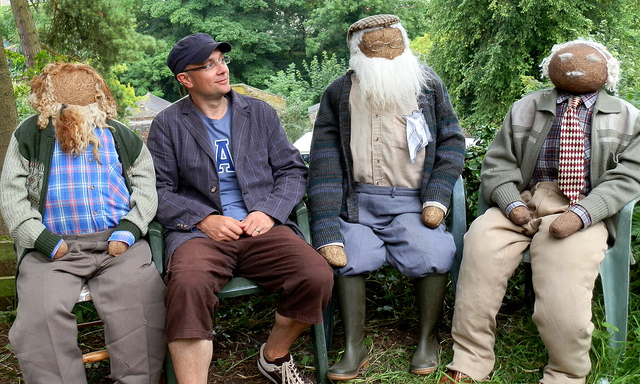
While there are obvious benefits to being part of a group, you know, like being less lonely, working together, blablabla, you can’t deny that there are groups that threaten your sanity. Such groups actively promote ‘we-them’ beliefs, say debates bukan budaya kita, and they expect you to always follow your leaders unquestionably (source, source, source, source and source). They emphasise group cohesion over freedom of thinking. So many jialat problems have arised from this: Columbia space shuttle explosion. Bay of Pigs invasion. War on Iraq. Allowance to songlap millions/billions of development money
The reality is, from the day you are born you will always find yourself joining groups. These groups may be religious, recreational, etc. Some of the more exclusive groups expect more of you. You must conform, integrate, or more extreme, assimilate. Sometimes it is not your choice – you are ‘born’ into them (thanks ma pa).
So what can YOU do about it? Or more specifically, what can you do if you are a blind political zombie and you want to see the ‘light’? Here are some points for your consideration:
- Remember that questioning and evaluating ideas are always healthy signs of critical thinking – no matter how stupid they may seem (source)
- Ignore the emotionally charged labels and character assassinations when evaluating ideas (source)
- Keep an open mind and be curious about understanding the positions of all relevant parties (source)
- Welcome dissonance as it would help open your mind. Learning that you are wrong is always better than living a misguided life.
- Observe not only the words, but also the actions of your leaders.
- If your group disallows you from having dissenting views, it could be a sign of group intolerance. If so, ask if it is worth being part of this group.
- If you want to make changes in the group, get as many like-minded people to amplify your views.
- If all else fails, consider seriously about leaving the group because groupthink can cause grave harm (source).
These are some fundamental safeguards to becoming a political zombie. So… What about people you know who are blind political zombies? Well, like the saying goes, you can lead a horse to water, but you can’t force it to drink. You might choose to respect their fundamental rights… to be a zombie.

- 7 MALAYSIAN NEWS HEADLINES TURNED INTO HORROR MOVIES! (2014)
- 7 MALAYSIAN HORROR MOVIE POSTERS BASED ON REAL NEWS – part 2! (2015)
- 8 GAME OF THRONES-LIKE TWISTS THAT HAPPENED IN MALAYSIAN POLITICS
- 2.0KShares
- Facebook2.0K

